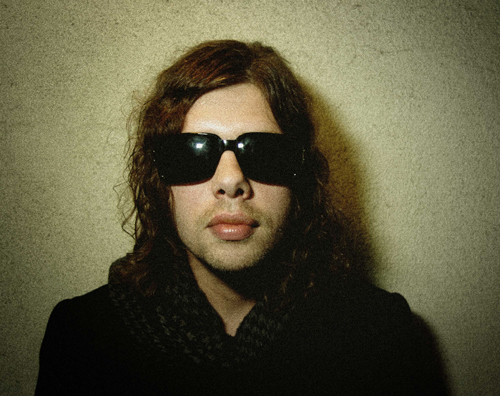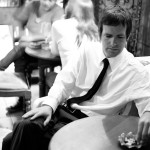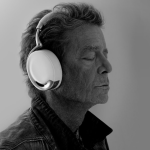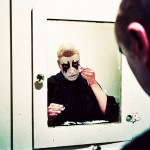
Photo/Text by J. Bennett
Before we met Dax Riggs, we’re pretty sure we’d never heard anybody mention Obituary and the Fairport Convention in the same sentence–much less as reference points for their own music. For shorthand purposes, we’d been referring to Riggs’ solo debut, We Sing Of Only Blood Or Love (Fat Possum) as the post-grunge Astral Weeks, but as the album spins on our turntable right now for what seems like the 400th time since it came out last year, that description is clearly an oversimplification. With songs about dog-headed whores, demons tied to chairs in Riggs’ brain, and a cover of Richard Thompson’s righteous post-Fairport hit, “Wall Of Death,” We Sing Of Only Blood Or Love is an infectious convocation of slow-burning Southern balladry, bleary-eyed blackened blues, and midnight suicide-soul, all of which Riggs presides over with the finest aw-haw in rock n’ roll and a little help from ex-Chavez/Zwan guitarist Matt Sweeney.
To back up just a bit: Many recall Riggs as one-half of Deadboy & The Elephantmen, whose 2006 album We Are the Night Sky stirred up a fair amount of well-deserved hype that year on the strength of Riggs’ songs and the fact that their lineup was not unlike that of the most famous candy-colored duo in the universe: guitar/vocal dude (Riggs) up front, and decidedly uncomplicated female drummer (Tess Brunet) in back. But Riggs has a rich musical history that stretches back years before Deadboy–a history rarely discussed and known only by the most dedicated underground metal scavengers. The truth of the matter is that our man cut his teeth as frontman for both Acid Bath and Agents Of Oblivion, the outcasts of the late 80s/early 90s sludge metal breeding grounds in and around New Orleans, Louisiana–the same swamplands that produced bands like Eyehategod, Crowbar and Soilent Green. As we hunkered down in our trusty green shitbox swilling tallboys before Riggs’ show at Spaceland in Los Angeles, the singer/songwriter took us on a trip down memory lane.
When did you figure out you could sing?
At a very young age–3, 4–I would just sing and have fun doing it. We’d play the guitar and sing all these hillbilly songs. By the time I was 12, I’d be singing Iron Maiden or Testament songs in the school bathroom, smoking cigarettes, and people would be like, “Hey, you kinda sound like that guy.” A lot of it was just singing in the bathroom, recording myself and playing it back. When I listened back, I’d kind of critique it.
Was Acid Bath your first band?
No, I’d been in other bands. I quit school when I was like 13 years old and moved to Florida to be in a thrash band with some other juveniles. We all worked at this phone place where you would sell people timeshares and stuff. Ever since then, I’ve always pretty much been in a band.
What happened with Acid Bath, anyway?
Well, our bass player [Audie Pitre] died. He was killed in a drunk driving accident. It wasn’t his fault. He was just driving with his family–his mom, dad and little brother. A drunk driver hit them and killed him and his parents. That’s the real reason it ended, but also, you know, it just wasn’t as fun. It had gotten to be kind of a mechanical organism, where people were dependent on us to live. It was too much to handle, and I wanted to get out of it. I’d been wanting to do something different for a while, but everyone [in the band] wasn’t really into–they just kind of wanted to repeat what we had done before. But the main reason was the death of the bass player, who was kind of the in-between guy as far as the super-heavy side of the band to the more Simon & Garfunkel side.
On paper, at least, it’s weird to think that two guys from that band–you and [former Acid Bath guitarist] Sammy Duet–took two such vastly different paths. You with Deadboy and now solo, and Sammy with Goatwhore. But it’s really not that weird, is it?
No. I mean, I still dig heavy music. I’m just more or less bored with it and feel like it’s been kinda sold out. There was a golden age for that kind of music and now it’s just kind of blah-blah-blah, you know? So I guess it does seem kinda weird, but we could all dig doom rock, you know? That’s where we all overlapped. And then there was a death metal side and a folkish side. But I still talk to Sammy. He really likes my new record. He wants to do something, and I think his attitude has changed, you know? I think he genuinely digs the new record, but I’m pretty sure he didn’t like the stuff before.
Deadboy, you mean?
Yeah. Or even Agents [Of Oblivion]. But he did say he really liked the new record, and that’s the first time I’ve heard him say that about anything I’ve done.
Are you a Goatwhore fan? Not to put you on the spot or anything.
[Laughs] I think it’s some cool stuff as far as that kind of music, but I can’t say I’ve even seen them … or would ever want to. I don’t want that to sound bad, but that’s the reason we split up, you know? That wasn’t the direction I wanted to go in.
Were you connected with the Eyehategod crowd at all?
I mean, they were around when we were playing. They definitely influenced us–especially Take As Needed For Pain. Another one was Exhorter’s Slaughter In The Vatican. We were kind of from the sticks, though, you know? We were the hicks. But everyone dug it, because it was different and we did stretch the boundaries, somewhat, of that kind of music. I’d never really heard anyone doing all these different vocals before we did it. There was the Exhorter style and the Bathory style, you know? Not both mixed together with, like, My Dying Bride or something. But in the early days of Acid Bath, we played with Eyehategod, Soilent Green, Crowbar–all those bands. Opening for Exhorder was our first big show. They were a huge band in our area at that time.
They were the band that influenced the next generation of heavy music in New Orleans–your generation.
Right. And they were more extreme than anybody else, as far as the violent sound of it, the ripping and punching-type vocal elements. And they were really nice guys. The first time Acid Bath played with them, they told us we had a lot of soul. They were always good to us. But then there became a rift between what we were doing and the bands that were accepted by the scene–the Panteras, Eyehategods, and Soilent Greens.
Why is that?
I really don’t know.
It seems like was Acid Bath was doing was much catchier than any of those bands.
You’d think that, but … I don’t know. I think certain people in that camp didn’t like the idea of what we were doing. We never really felt like we were a part of that scene, you know? And I don’t really want to get into it, because I have no bad vibes with anybody, but when Pantera played at the big stadium in New Orleans, they mentioned all these local bands, but not us. It’s like they almost didn’t wanna mention us. But people in the audience were screaming our name until they finally said it and we got the biggest applause of all the bands that he had mentioned–Eyehategod, Soilent Green, Graveyard Rodeo. I think Eyehategod and White Zombie actually opened that show. That was right near the end of Acid Bath, if I remember correctly.
Did you go straight into Agents Of Oblivion after that?
I kinda fucked around for like a year, I think. I stopped drinking, stopped smoking cigarettes, and started smoking a lot more dope. I kinda went inward … I don’t know. And then I thought I’d tie up the contract with some songs that I had written. I’d been writing all kinds of stuff during that period–some of it was used by Acid Bath, like “Bleed Me An Ocean”–but some if it wasn’t. A lot of times they’d just take little parts and work them in. After about a year of that, I started Agents.
That band was pretty short-lived.
Yeah. What happened was that we thought maybe we could get out of that record contract [with Rotten Records], but we were out on this horrible tour, not making any money, so we were just like, “fuck this.” But I had been planning on doing Deadboy & The Elephantmen since Acid Bath. I even brought it up to them during the second record. I wanted to change the name to Deadboy & The Elephantmen and just do something totally different.
“Skulls” (Misfits cover)
[youtube=http://www.youtube.com/watch?v=X7U4swK086w]
There was a lot of big talk about Deadboy for a while, with all the obvious White Stripes references thrown in. Did that bum you out at all?
The way I looked at it was like, “Say whatever you want; write whatever you want. If anyone gets into it, that’s fine by me. But if that’s all you can say about it, you’re not very imaginative. You’re not really listening.” We didn’t sound very much like them. For one thing, we weren’t that blues-based. We were vocally soulful, but we weren’t blues-punk or anything. But I do think their success was an inspiration to us. At that time, they were the biggest band in the world, so we thought, “If they can do it, why can’t we do it?” They definitely opened the door for a two-person setup.
Were people under the impression that you two were a couple?
Sometimes.
But you weren’t.
No.
You seem to move on to new things pretty quickly.
Well, you know, we’d tour a lot and play all these big festivals, and I’d see all these bands with their good drummers and I’d think to myself that she might not be able to keep up with the stuff I wanted to do in the future. I wanted to progress, you know? I didn’t want to do another We Are the Night Sky.
The Matt Sweeney connection has worked out pretty well. He helped you get signed to Fat Possum, and then played on your solo album.
Yeah, he genuinely got into it. We totally bonded on several levels, because he could get into bands like Obituary but also understand Townes Van Zandt and Fairport Convention.
Hence the Richard Thompson cover on We Sing Of Only Blood Or Love.
Exactly. It was Fairport Convention and Obituary.
Did Fat Possum ever want you to put out We Sing Of Blood Or Love as a Deadboy record?
Strangely enough, it was really Matt Sweeney’s idea to call it a Dax Riggs record. He was like, “Look, we’re using three different drummers. This is a Dax Riggs record.” At first I couldn’t deal with that, but the more I thought about it … there was always this problem in the past where if I called what I was doing Deadboy but then showed up somewhere and played the gig by myself, it wasn’t considered Deadboy & The Elephantmen. I always wanted Deadboy to be whatever I wanted it to be, no matter who I was playing with, so it dawned on me that if I just called it Dax Riggs, you know, then I could actually do what I had set out to do with Deadboy because it wouldn’t be perceived as a band that had to be this or that. Once you attach a band name to something it almost seems like people expect things. Promoters, especially, don’t understand how a band can really be a solo project.
The guys in your band now are from all over the place. Do you prefer playing with people who aren’t from your neck of the woods?
Well, I’d have to say yes. To get people from around my area in Houma [Louisiana] isn’t easy, because it’s a very hard existence for a musician to live in. For the downtime, the in-between times, there’s not a lot to do. The guys I’m with now can do other things when I’m not touring or recording, but the guys I was working with in Houma didn’t have those opportunities, so they were totally losing their shit when we weren’t doing anything. I recently moved to Austin, Texas, though.
What brought that on?
I just really like it there. I think it’s a nice place to play shows, and my booking agent lives there, my management lives there, I have several friends who live there. And it’s a nice place for a kid to live. I have a seven-year old boy. I was thinking about New York, but that seems like such a harsh environment for a kid, not to mention expensive.
Deadboy & The Elephantmen, “Stop, I’m Already Dead”
[youtube=http://www.youtube.com/watch?v=GEPI3KIxhAs]
To what extent would you characterize the songs on We Sing Of Only Blood Or Love as autobiographical?
I do think they have to do with the ways that I’m feeling. “Living Is Suicide” is … just … you know, just being here is dying. I think it’s almost Lee Hazelwood’s take on thrash music themes–even though it doesn’t sound like that. And the songs are sometimes sarcastic, but there’s truth in there. “Demon Tied To A Chair In My Brain” is kind of about the Dr. Jekyll and Mr. Hyde thing I have. Everything’s fine now, but a couple of hours from now, I might be a different person, you know? “Didn’t Know Yet What’ I’d Know When I Was Bleeding” is about living and not knowing how bad something’s gonna hurt until it actually hits you. It’s all in the title, I guess. I think it’s all real shit. A lot of people think it’s some kind of ghoulish fantasy, but it’s all rooted in reality.
It seems like your lyrics have improved considerably over the last few years. Is that just the process of getting older, or have you become more discriminating in your writing?
Oh yeah, totally. I mean, Leonard Cohen might spend a year on a verse, but I’ll definitely spend 12 hours on one, just twisting things and trying to make it not so common, and adding different points of view to the ways it can be interpreted. It’s a really big deal to me–it’s gotta be something worth singing.
Do you have many new songs written?
I have some in their primitive states, yeah. We have another tour coming up in February, and after that I’d like to take some time off and write. Music has become such a way of life now, and I’d like to write with that in mind. I mean, maybe it’s not a good thing to think things through so much, but at this point in my life, if I had some time, I feel like I could write some of the best songs I’ve ever dreamed of.



